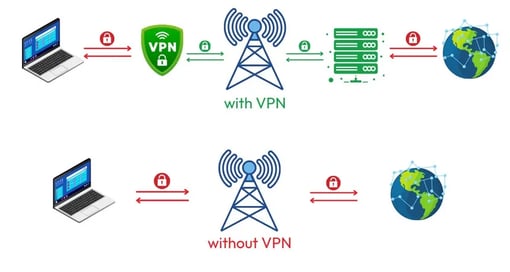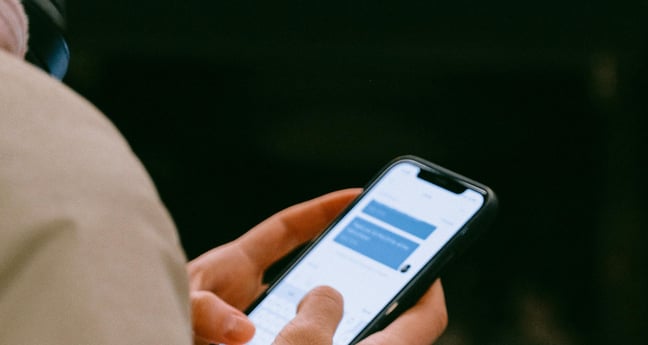Are your devices secure?
5 steps you can take to protect your online privacy
Fabian Hall
5/8/20245 min read


In an era where digital footprints are inevitable, online privacy has become a critical concern. Whether it's hackers looking to exploit your personal information or companies aiming to profit by selling your data, protecting your privacy is more important than ever. The good news is, there are effective steps you can take to safeguard your personal information from these threats. Below, we outline the top 5 most important steps you can take to protect your online privacy and user data.
1. Use Strong and Unique Passwords for Every Account
One of the easiest ways for hackers to gain access to your accounts is through weak or re-used passwords Unfortunately, many people continue to use simple passwords or recycle the same ones across multiple sites or services, which makes it easier for hackers to break into their accounts if any of these services have a data breach.
How to Protect Your Accounts
STOP USING THE SAME PASSWORD! for each of your accounts. A strong password should include a combination of uppercase and lowercase letters, numbers, and special characters. With big companies and small business facing the threat of malicious hacks every day it is important you aren't relying on someone else to keep your data safe.
Use a password manager Password managers make it easy to manage and secure complex passwords without the risk of forgetting them. Avoid any password management subscription that requires payment or provides online registration with cloud synch as such systems make the anonymity associated with a password manager useless.
Enable two-factor authentication (2FA) wherever possible. With 2FA, even if a hacker gains access to your password, they will still need the second authentication factor (like a code sent to your phone) to access your account. By securing your accounts with strong, unique passwords and enabling 2FA, you're taking a huge step in protecting your data from malicious hackers.
2. Use a VPN to Encrypt Your Internet Connection
Public Wi-Fi networks, such as those found in cafes, airports, and hotels, are often not secure. Hackers can easily intercept unencrypted data on these networks, potentially gaining access to sensitive information such as passwords, emails, and even bank details.
Why You Need a VPN:
Virtual Private Network (VPN) encrypts your internet connection, making it much harder for hackers to intercept your data on public Wi-Fi where encryption is not provided. A VPN hides your real IP address and routes your traffic through a secure server, adding an extra layer of security and privacy. A VPN does not make you anonymous, and does not stop tracking.
3. Limit the Data You Share with Websites and Apps
Every time you sign up for a new website or use a new app, you’re often asked to provide personal information. While some of this is necessary for functionality, many websites and apps collect more data than they need. This data is being sold to third-party companies used for targeted advertising.
How to Control Your Data:
Review privacy settings on websites and apps. Many platforms offer options to limit what information you share or make your profile private. Take advantage of these settings to protect your personal details.
Use multiple email addresses The use of multiple unrelated email addresses keeps your accounts untied and unrecognized in the case of a data breach with services you use minimizing damage across the board.
Avoid sharing unnecessary personal details Be cautious when apps or websites ask for information such as your phone number, address, or even your location. If it’s not essential for the service, don’t provide it.
Taking the time to limit the data you share not only reduces your digital footprint but also decreases the likelihood of your information being sold to third-party advertisers or falling into the wrong hands.
4. Be Cautious About Phishing Scams and Suspicious Links
Phishing attacks are one of the most common ways that hackers gain access to personal information. These scams typically involve fraudulent emails, text messages, or websites that appear to be from legitimate sources, tricking you into entering your login credentials, credit card numbers, or other sensitive data.
How to Spot and Avoid Phishing:
Don’t click on suspicious links Emails, texts, or messages from unknown sources with links should never be opened. If you receive a link or attachment from an unfamiliar contact, be cautious before opening it.
Check the URL of websites before entering personal information. Phishing sites often mimic real websites but have slight differences in their URLs, such as misspellings or additional characters.
Verify requests for sensitive information. If you receive an email or text asking for personal details, always double-check with the company directly through their official contact methods. Remaining vigilant about phishing scams is a crucial step in protecting your privacy and ensuring that hackers cannot gain access to your accounts or sensitive information.
5. Regularly Update Your Software and Use Third-Party Scans
Outdated software, apps, and operating systems are vulnerable to security exploits. Cybercriminals frequently target these weaknesses to gain unauthorized access to your system or steal data. Keeping your software up-to-date and using reliable protection is an essential step in safeguarding your online privacy.
How to Stay Secure:
Enable automatic updates on your operating system and apps to ensure they’re always protected with the latest security patches. Most malicious attacks are targeted at outdated systems leaving you vulnerable to attacks when not working on the latest updated versions.
Enable a firewall To help prevent unauthorized access and alert you about suspicious activity.
By staying on top of software updates and running regular antivirus scans, you’re significantly reducing the risk of malicious attacks that could compromise your privacy.
Take Control of Your Online Privacy
Protecting your online privacy isn’t just about securing your personal data—it's about taking control of your digital life. By following these top 5 steps, you can greatly reduce your chances of falling victim to hackers or companies that want to profit from your information.
Use strong passwords and 2FA to secure your accounts.
Protect your internet connection with a VPN on both private and public networks.
Limit the personal data you share online and adjust privacy settings accordingly.
Stay vigilant against phishing scams and always verify requests for sensitive information.
Regularly update your software and use antivirus protection to keep your devices secure.
In today’s digital age, privacy is a right you should actively protect. By taking these simple yet effective steps, you can ensure that your personal data remains in your hands, safe from malicious hackers and profit-driven companies.



